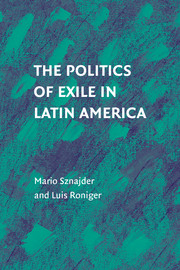Book contents
- Frontmatter
- Contents
- Acknowledgments
- List of Acronyms
- Introduction: The Politics of Exile
- 1 Defining the Exilic Condition
- 2 Forceful Displacement, the Construction of Collective Identities, and State Formation
- 3 The Format of Early Exile
- 4 Sites of Exile
- 5 Widening Exclusion and the Four-Tiered Structure of Exile
- 6 Exile Communities, Activism, and Politics
- 7 Presidents in Exile
- 8 Is Return the End of Exile?
- Bibliography
- Index
- References
1 - Defining the Exilic Condition
Published online by Cambridge University Press: 28 July 2009
- Frontmatter
- Contents
- Acknowledgments
- List of Acronyms
- Introduction: The Politics of Exile
- 1 Defining the Exilic Condition
- 2 Forceful Displacement, the Construction of Collective Identities, and State Formation
- 3 The Format of Early Exile
- 4 Sites of Exile
- 5 Widening Exclusion and the Four-Tiered Structure of Exile
- 6 Exile Communities, Activism, and Politics
- 7 Presidents in Exile
- 8 Is Return the End of Exile?
- Bibliography
- Index
- References
Summary
The purpose of this chapter is to place the study of political exile within the broader domain of studies of the exilic condition. We define political exile as a mechanism of institutional exclusion – not the only one – by which a person involved in politics and public life, or perceived by power holders as such, is forced or pressed to leave his or her home country or place of residence, unable to return until a change in political circumstances takes place. This definition covers both those directly persecuted by the authorities or by other violent political actors, such as paramilitary groups and guerrilla organizations, as well as those who choose displacement and expatriation as they sense an existential threat or problem originating in political quarters; and those who, once abroad as voluntary sojourners, discover that the changed political circumstances prevent their return. Ostracism, forced displacement, and exile are, in our view, the result of political settings prone to exclude a myriad of actors, whose political voice the power-holders cannot digest and contain within the polity. We thus consider exile to be a major form of institutional exclusion, a tool profusely used by states to ban political dissidents.
Octavio Armand, a Cuban poet in exile, once said that for a displaced person, “to be is not to be [I am from where I am not present].…”
- Type
- Chapter
- Information
- The Politics of Exile in Latin America , pp. 11 - 39Publisher: Cambridge University PressPrint publication year: 2009



